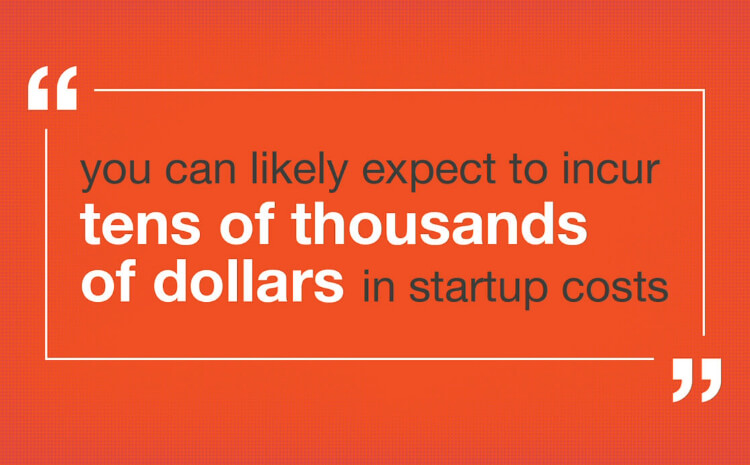Understanding the costs of starting a business
Taking the first steps towards launching your own business is an exciting moment on your journey as an entrepreneur. During this time, it’s essential to have a good understanding of the costs involved with getting your business up and running.
Startup costs are the expenses incurred before you officially launch your business, posing unique financing challenges that can sneak up on you. These costs can vary widely depending on the type of business you’re starting, but you can likely expect to incur tens of thousands of dollars in startup costs. The U.S. Small Business Administration (SBA) offers a calculator to help estimate your costs depending on the type of business you’re starting.

The initial capital needed to launch a business lays the groundwork for many of the one-time expenses you’ll need at the onset for registering, licensing, permits, and advisor team fees (think your lawyer, CPA), as well as the reoccurring costs we’ll cover below. When it comes to ways to secure funding (from traditional business loans to crowdfunding) for that initial capital, we have a whole article dedicated to options to consider.
Rent and utilities
If you’re looking to open a brick-and-mortar business or need office space, rent and utilities are one of the primary costs you’ll need to consider to get started. These are significant expenses that amount to a large portion of your budget, and many owners consider conducting their business online or remotely during the initial phases for this reason.
Inventory and supplies
This one applies to nearly all types of businesses, regardless if you're selling a product or service or if you’re operating remotely or in a rented space. Some businesses require more supplies than others, but at the very least you’re likely to need some basic equipment and technology. In an office or storefront setting, it’s easy to overlook everyday items like pens, paper, and toiletries for employees and customers, but these smaller purchases can add up too. It’s important to think through your inventory and supply needs on a monthly basis to understand how much you need to budget for this expense.
Insurance
Unlike supplies and inventory, insurance isn’t tangible and can be easy to overlook when starting a business. But when it comes to protecting your assets, the importance of a good insurance policy can’t be overstated and in some cases it’s required. Insurance policies you’ll want to be prepared to purchase might include liability insurance, property insurance, errors and omissions insurance, and workers’ compensation insurance.
If your company plans to use cloud-based software or just move further into digital territory like many businesses today, cyber insurance is something you’ll want to consider. To learn more about the risk of cyber attacks to your business, importance of cyber insurance being added to a small business policy, and how to mitigate loss, check out our Sharing Knowledge Series episode on this topic.
Employees
While it’s true that many new entrepreneurs forgo hiring additional employees during the early phases of their business, the reality is that for your business to grow, a time will come when hiring is inevitable. That’s why you should budget in the cost of potential salaries, benefits, payroll taxes, and retirement plans so that you can be ready to bring on new talent. If you don’t have the budget to hire a new employee, you might find that hiring outside consultants or advisors can give you the support you need while saving on costs.
Marketing
Business promotion comes naturally for some businesses, but in this day and age all businesses stand to benefit from dedicated marketing efforts. From market research and developing a logo, business cards, and website to creating and maintaining a social media presence and public relations efforts, it will take some level of investment to effectively reach and grow your customer base.
Having a bank in your corner
From business loans to strategic advice, it’s invaluable to have a committed banking partner on your side. Westfield Bank is dedicated to reinvesting in our communities and help aspiring entrepreneurs like you thrive. Get in touch with us today to learn more about how we can help you reach your business goals.



